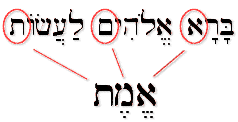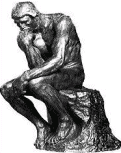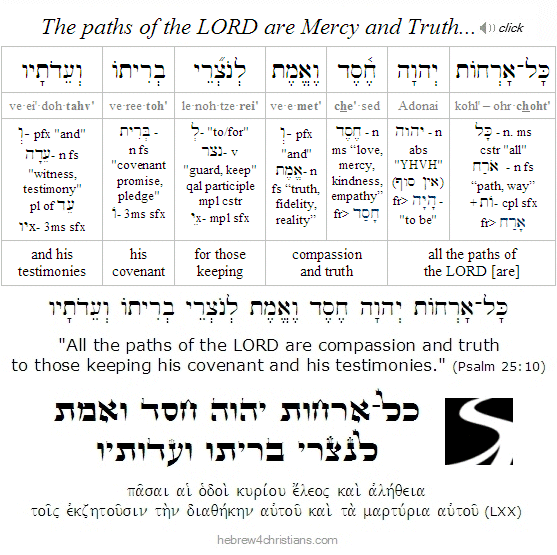|
The Hebraic conception of truth, while not denying the importance of correspondence, seems to have a different focus. The Hebrew mind seemed less preoccupied with static and unchanging essences than with the (dynamic) formation of the character of the person (resulting in a sense of obligation to "restore" the world). Especially in relation to Adonai, to Whom the Jew must give account, the idea of truth became grounded in moments of moral decision encountered in one's life. Shall I steal? Shall I turn a blind eye to social injustice? etc.
The Seal of God is truth
Certain Jewish sages said that "the seal of God is truth," since the final letters of the three words that conclude the account of creation -- bara Elohim la'asot ("God created to do" [Genesis 2:3]) -- spell the word for truth (emet):

In other words, God created reality "to do" (la'asot), which has come to be interpreted by these sages as meaning that it is our responsibility, as God's creatures, to complete the "doing" of His Creation (tikkun Olam). Truth is about doing, not being; it is centered upon the realm of duty and obligation, and is grounded in the mandate to "name" the creation.
Note that the "Seal of God" is not just a matter of sincerity. It is rather a matter of being true in the sense that you are living it, you are being with it, you are part of it. You exist inside this truth as a passion and this truth informs all of the decisions you make in life. You therefore embody the truth and follow it in all your endeavors. In this sense Yeshua the Mashiach is the Truth, since in Him there was no mismatch between who He is and what He said. He is utterly trustworthy. His actions and speech are one and are entirely reliable. Jesus is the "Seal of God," the one who authoritatively names of all creation, and His followers likewise should evidence this in their lives.
Truth Encompasses all
In Hebrew, the word for truth, emet (ЧҗЦұЧһЦ¶ЧӘ), contains the first, middle (if you include the sofit letters and Sin/Shin as separate letters) and the last letter of the Hebrew alphabet, which seems to suggest that the truth contains everything from Aleph to Tav:

Since truth is all-encompassing, there is always a place for it to be practiced -- there is literally no place or experience that is exempted from its presence -- and therefore, there is always the demand to live in its light. Indeed, God Himself is called the Spirit of Truth (Ruach HaEmet) (see John 14:16-7, 15:26, 16:13).
The word emet comes from a verb (aman) that means to support or make firm, and expresses the image of the strong arms of a parent supporting a helpless infant. Truth stands in active relation to the one who is supposed to know it and "carries the burden," so to speak, by being the foundation of one's existence in creation.
Of the thirteen attributes of the LORD listed in Torah, two are joined together. The LORD is said to be rav chesed ve-emet, "abundant in lovingkindness and truth." This juxtaposition may seem strange in a world of both good things and evil, but even in moments that threaten and challenge us in life, faith says "Amen" to the disclosure of difficult things by resting in the lovingkindness of God.
God is moreover referred to as Dayin HaEmet, the Righteous Judge, since He alone is the One to say what is to live, move, and have being in His creation. Baruch Dayan HaEmet is a blessing of submission said at a time of bereavement for the Jew. Even in light of death, or even in moments of extreme testing we can ultimately trust that all things work together for good for those who love Adonai (Romans 8:28).
There is no Truth apart from God
As already mentioned, the word emet (ЧҗЦұЧһЦ¶ЧӘ), "truth," consists of the first, middle, and last letter of the Hebrew Aleph-bet, indicating that truth encompasses all things and endures from the beginning (Чҗ) to the end (ЧӘ). But notice that if we remove the letter Aleph from the word, we are left with ЧһЦөЧӘ, (dead), the opposite of Ч—Ц·ЧҷЦјЦҙЧҷЧқ (life). The letter Aleph is the ineffable letter that represents oneness and God's preeminent glory. Therefore, if we attempt to ignore or suppress God in our understanding of truth, we end up with death.
Truth is a Person
The LORD Yeshua our Messiah is called the Aleph and the Tav (Ч”ЦёЧҗЦёЧңЦ¶ЧЈ Ч•Ц°Ч”Ц·ЧӘЦјЦёЧ•), "the first and the last" (Ч”ЦёЧЁЦҙЧҗЧ©ЧҒЧ•Ц№Чҹ Ч•Ц°Ч”ЦёЧҗЦ·Ч—ЦІЧЁЧ•Ц№Чҹ). These are clearly divine titles that exclusively belong to YHVH (Isa. 41:4, 44:6, 48:12; Rev. 1:1,17-18; 22:13). Indeed, Pilate's famous question, "What is truth?" is a category mistake, since truth is not about "what" but about "Who." That is, truth is not something objective and static, a thing to be known and studied from a distance. No. Truth is up-close and personal. Understood in this way, truth is a way of living, a mode of existence, and inherently relational. It is a mistake to think of God as an "object" to be studied. No, God is not some static thing but rather a dynamic and forceful Person. Unlike the Greek philosophers who tended to regard God as little more than a "machine" (deus ex machina) or device that caused the universe to "get going," the LORD God of Israel is intensely personal, feeling, emotional, compassionate, angry, and so on. The Hebrew view of God is that of a Living Person, a Spoken Word, and a Fiery Breath that broods over the events of the physical world.
Hebrew Lesson
Psalm 25:10 reading (click):
For more on this, see Yeshua and the Aleph-Bet.
<< Return
|
|



